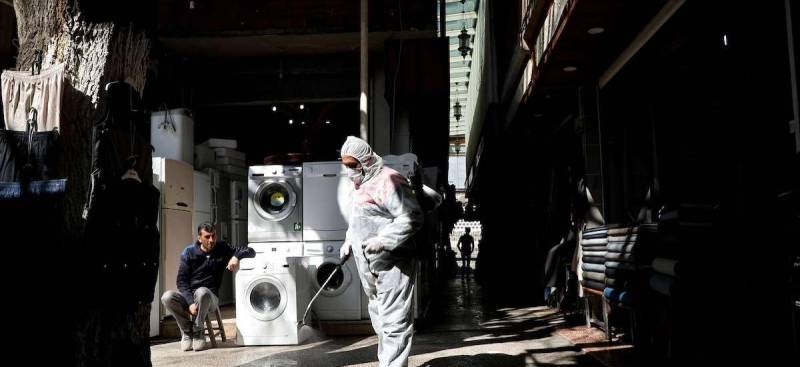Although there has been slight improvement in coronavirus treatments in Turkey’s unofficial Kurdish capital of Diyarbakır over the past four or five days, they are still not adequate.
In upper-middle class districts of the southeastern city, such as Diclekent, cafes, restaurants, and salons have closed down, but many other businesses such as furniture stores, electricians, and toyshops remain open. Densely populated districts such as Bağlar, and Sur, the heart of the city, continue to be crowded, and over half of businesses are open.
Why are people refusing or unable to take precautions? Is information about precautionary measures not reaching people? I am thinking through all of this, and trying to understand the state of mind of people in my hometown. An important issue here is the problem of trust.
For a long time, Kurdish people have not had leaders and institutions to reassure us in crisis situations like this. The ruling Justice and Development Party (AKP) has repeatedly made promises about peace, fixing the economy, recognising our identity, and respecting democracy.
But AKP ministers and politicians have consistently failed to follow through on their promises. Kurdish people have no reason to believe their most recent announcements.
Our own institutions are in disarray. We do not have a mayor in Diyarbakır to speak out on our behalf in such a life-or-death crisis, because our mayor (who also happens to be one of the best doctors in the city), Selçuk Mızraklı, is in prison.
Many of our other institutions have lost their effectiveness as a result of years of pressure, especially over these past two years. Their ties to the public have weakened, and the institutions that were most closely engaged with the people have been shut down. As a result, people here are gripped by a general feeling of abandonment.
There is of course an issue of leadership and dialogue as well. Currently, there is no leader to speak to the Kurdish people in a time of crisis. The strongest leader who could speak to us is Selahattin Demirtaş, the former co-chair of the Peoples’ Democracy Party (HDP), who is in prison. Although he sends messages from prison from time to time, these messages would be more effective in person.
A lack of dialogue is a serious problem. The government trustee assigned by the central government to replace the mayor has not established any dialogue with the residents of the city. The city residents do not have much of an expectation of dialogue from the trustee. But if the city had a leader that we had elected, whom we trusted, believed, loved, respected, and embraced, people would probably listen to that person and be more willing to take necessary precautions against the coronavirus.
Instead, today we are a people who do not even trust our municipalities. We avoid government buildings unless strictly necessary, who are separated by police barriers from their government.
Another problem is the fact that executive orders have closed down most of the city’s non-profit organisations over the past four years. We no longer have the grassroots that can convey messages to the public. We do not have institutions that can act as intermediaries. Our women’s organisations, children’s organisations, anti-poverty organisations, youth organisations. Virtually all of them have disappeared.
The Sarmaşık (Ivy) Association for Combating Poverty, which was shut down through executive order in September of 2016, used to provide food and support every month to the city’s most impoverished 4,500 families. If Sarmaşık were still open today, the organisation would have provided the necessary support for those families.
Instead, former leaders of Sarmaşık, like Mızraklı and Şerif Camcı, are instead accused of supporting terrorist organisations because of their work combating poverty, and are put on trial. The pressures, firings, and court cases that have been brought against members of organisations like the Turkish Medical Association and the Healthcare Workers Union have weakened institutions that serve important functions in pandemics. In the past five years, the government has tried every tactic to weaken non-profit organisations in Kurdish cities, from closures to arrests and firings.
Kurdish society is an organised and connected society, but the government has worked hard to destroy institutional unity in the past few years through executive diktats. It has been partially successful.
Another reason behind the apathy towards the coronavirus is of course the fighting and destruction that we lived through in 2015-2016. This state of mind is evident in many Diyarbakır residents, from children to the elderly. After what we have seen – the bodies left in the streets, Sur collapsing on us, after months of bombing – it is hard to push people into taking sufficient coronavirus precautions.
We have been at home for a week with the children, and we have run out of cheese. Braided cheese, a regional delicacy, is important for the people of Diyarbakır. I go to the dairy behind our house, which is open and busy. Coronavirus is nowhere to be found.
Without fully entering the shop, trying to maintain my distance, I ask the young person working at the shop to give me two kilograms of braided cheese. I say, “I wish you would wear gloves and a mask.” Strange glances are exchanged. In the packed shop, an elderly man calls out to me: “Daughter, forget about coronavirus. After all that we have seen, koronavirüs çî ye?”*
Laugher takes hold of me …
* Kurdish for “What is the coronavirus?”
